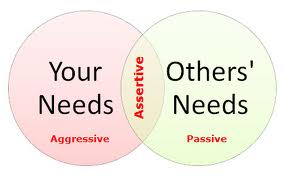What Is Assertive Communication
Many people find that a huge amount of the stress they experience is caused by ineffective communication. How often do you say: “Yes, I’ll do that, I don’t mind”? And how often do you actually mean you don’t mind?
 All too often we put ourselves on the line and over-extend ourselves in order to help somebody else conserve their time and energy! Of course there is nothing wrong in helping somebody because you want to and you choose to. A problem exists when you would prefer to say “no” but find yourself saying “yes”. Stress, anxiety and burnout are common allies of people who haven’t learned how to say “no” appropriately.
All too often we put ourselves on the line and over-extend ourselves in order to help somebody else conserve their time and energy! Of course there is nothing wrong in helping somebody because you want to and you choose to. A problem exists when you would prefer to say “no” but find yourself saying “yes”. Stress, anxiety and burnout are common allies of people who haven’t learned how to say “no” appropriately.
In order to be assertive about our needs and wishes, we need to practice effective communication.
Some points to bear in mind:
- Think very carefully before agreeing to take something on.
- When you want something, know what it is you are asking for and rehearse it first.
- Always ensure that you talk from your ‘adult’ self. A child talks “up” from a position of inferiority; a parent talks “down” from a position of superiority; an adult talks “across” from a position of authority and neutrality.
- If it is important to you then it matters. Remain assertive, use the “stuck record” method if that helps. This means choosing a phrase that sums up your position and then simply repeating it, in a quiet, authoritive way. This will help you to refrain from becoming aggressive and over-stating your case, or passive and under-stating it.
- Listen carefully to the other person and repeat back what they have said (reflective listening).
- Be concise.
- Be positive – expect a good outcome and you will invariably get one.
- Be aware of your body language – try to keep your body and facial expressions relaxed.
- Remain polite at all costs and don’t lose your temper!
Major keys to remaining assertive: 
- Mutual respect for both your needs and the needs of others;
- Active Listening;
- Understanding and respecting each other’s position.
